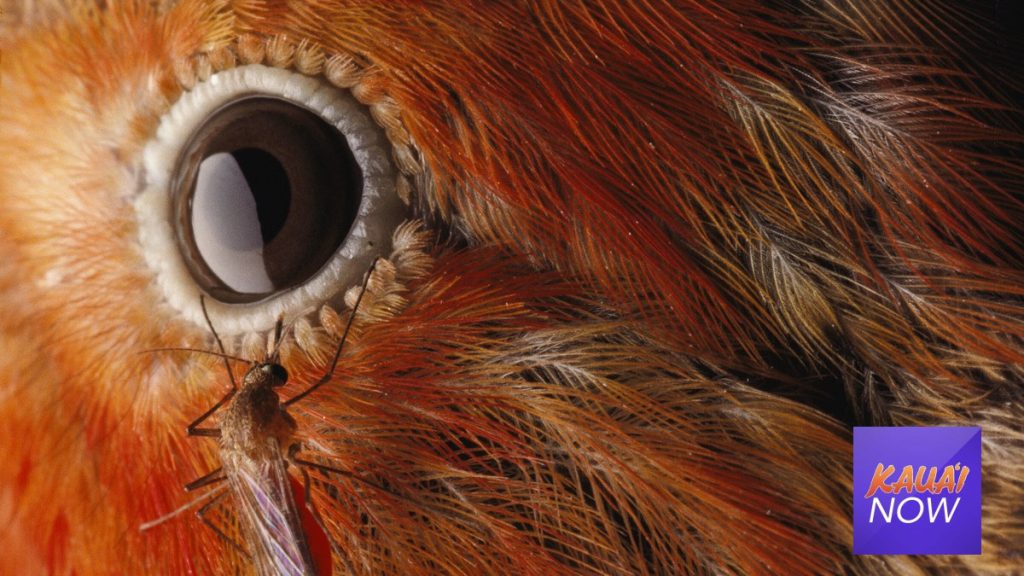Council Supports ‘Mosquito Birth Control’ To Save Kauaiʻi’s Endangered Birds

Earlier this month, a critically endangered honeycreeper, an ‘akikiki named Carrot, was rescued from a valley deep in the Alaka‘i Plateau where the species is experiencing a perilous decline as malaria-carrying mosquitos have moved into their territory, killing them one by one.
To try to help the native forest birds escape extinction, the Kauaʻi County Council passed a resolution on Sept. 7 urging elected officials throughout the state to fund and implement mosquito birth control.
“Hawai‘i has the dubious status of the ‘bird extinction capital of the world,'” councilmember Luke Evslin said. “This resolution recognizes support for efforts for the control of mosquitoes on a landscape scale in Hawaiʻi.”
Throughout the Hawaiian islands, 95 of 142 endemic bird species have become extinct, according to the resolution. The ʻakikiki likely will become No. 96 if nothing is done about the demise of its ecosystem.
As the climate on the Garden Isle continues to warm, Culex quinquefasciatus, also known as the southern house mosquito, has expanded its range and is now found among the highest elevations, where the last remaining populations of native forest birds reside.
There were once more than 55 different species of honeycreepers living throughout the state. Only 17 species remain today, and 11 of those species are federally endangered or threatened. The International Union for Conservation of Nature lists 15 species as vulnerable or worse.
The variety of honeycreepers on Kaua’i include the ‘akikiki, ‘akeke’e, ‘anianiau, Kaua‘i ‘amakih, and the ‘i‘iwi, which all face multiple threats like habitat loss, invasive plants and animals, disease, inclement weather, and non-native avian malaria.
Currently, multi-agency partnerships are evaluating the use of common, naturally-occurring bacteria as a “mosquito birth control” to suppress mosquito populations. They also are seeking to secure the technology, deployment methods, funding, governmental approvals, and community support to successfully apply the technique.
Dr. Lisa “Cali” Crampton, Coordinator for Kaua‘i Forest Birds Recovery Project, told the county council that Wolbachia is a naturally-occurring bacteria present in over half of all insect species worldwide and plays an important role in insect reproduction.
“It can function like birth control,” Crampton said. “Mosquitoes with one strain of Wolbachia can only successfully reproduce with females with the same strain of Wolbachia.”
In a laboratory, researchers can transfer an incompatible strain of Wolbachia into mosquitoes, rear large numbers of mosquitoes, and then separate mosquitoes by sex, so only incompatible male mosquitoes are released into the wild.
Male mosquitoes do not bite birds or people when released into the wild and do not transmit diseases. When the Wolbachia-incompatible males mate with wild female mosquitoes, the eggs laid do not hatch.
Wolbachia mosquitoes are currently being used in some states on the mainland, but only for Aedes aegypti, the primary species responsible for transmitting human viruses such as Zika, dengue, chikungunya, and yellow fever. Wolbachia mosquitoes have not been used before on mosquito species that harm native Hawaiian birds.
Crampton also said before any release of Wolbachia mosquitoes occurs in Hawaiʻi, the Wolbachia-infected males must be field tested to show that the strategy that employs Wolbachia as a biopesticide will work. The scenario is based upon Wolbachia-induced conditional sterility, known as cytoplasmic incompatibility, and the repeated release of incompatible males to suppress a population. A criticism of the Wolbachia biopesticide approach is that unintended female release or horizontal Wolbachia transmission can result in population replacement instead of suppression.
A collaboration of state, federal, and private, nonprofit partners evaluating the potential for control of mosquitoes would have to obtain an experimental use permit issued by the U.S. Environmental Protection Agency.
While Kaua’i Mayor Derek Kawakami has not reviewed this resolution, he said in an email that he looks forward to learning more about what these efforts would entail and the impacts they would have on the environment as a whole.
“Efforts to protect and preserve the health of our ecosystem remain important topics for our leaders and community members, especially when we live in a beautiful and lush environment like Kaua‘i,” Kawakami said.
For more information on targeted techniques that could drastically reduce mosquitoes in Hawaiian forests, click here.
For more information on the conservation of Kaua‘i’s native forest birds, click here.



